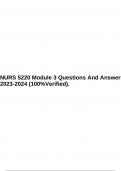Exam (elaborations)
NURS 5220 Module 3 Questions And Answers (100%Verified).
- Course
- Institution
NURS 5220 Module 3 Questions And Answers (100%Verified). Module 3 Questions Chapter 5- Mental Status Ms. Pammy is a 36-year-old woman who presents to your office with a complaint of depression. She is experiencing anger, fear, and sorrow. Which of the following regulates feelings of anger, fe...
[Show more]



